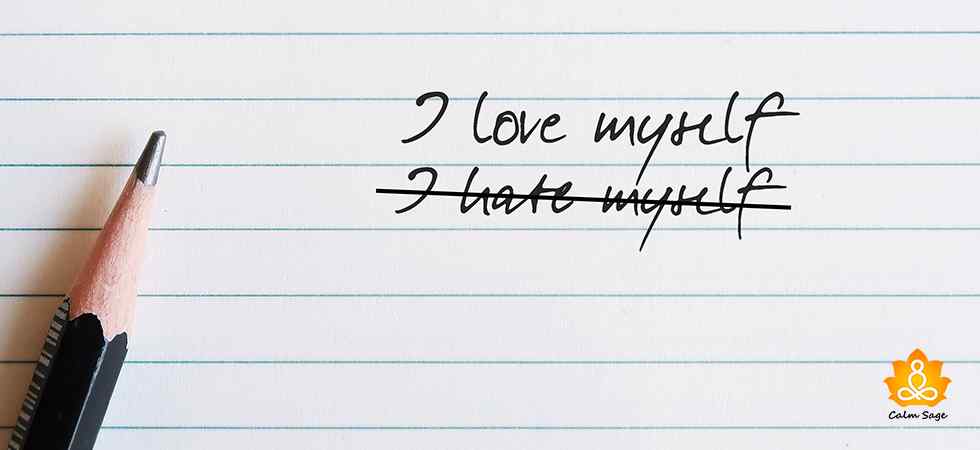Self-Loathing Or Self-Hatred: What Is It And How To Overcome It

“There’s no point in trying, I know I won’t be able to do it?”
“I know, I will fail.”
“I know, I am a loser.”
“I know, nobody wants to be around me.”
“Look, I knew it; I would screw it up again.”
“Can’t I just behave normally?”
Is your life also filled with such negative thoughts? Do you also criticize yourself throughout the day? When self-criticism goes on an extreme level, it converts into self-loathing or self-hatred. Self-loathing does not come from other people, family members, or friends, it comes from us only.
Self-loathing is not good for our mental health especially when it is on an extreme level. Self-loathing or self-hatred takes you to another level of thinking wherein you start feeling like you’re not good enough for anything or you don’t deserve anything. Self-loathing makes you feel like you’re unworthy.
Self-loathing is that devil angel that stays on your nose 24*7. And, keep on pointing out your flaws, shaming you for all the mistakes you might have done in the past, and criticizing you all the time. Do you wish to remove the devil angel permanently from your life?
Read this blog to stop the self-loathing cycle and live life positively.
Let’s get started!
Causes of Self-Loathing

Self-loathing develops with time and increases self-criticism. It can be triggered by past, trauma, false expectations, learned behaviors, perfectionism, and social comparisons.
1. Trauma
Trauma is the major reason behind self-hatred. Trauma can be physical, sexual, neglect, or emotional abuse. When someone experiences trauma, they begin to think that people are unsafe and dangerous. To make sense of their thinking, they start developing self-hatred and unworthiness.
2. Pleasing others
Sometimes, we wish to stay connected with others and when such expectations are not met, we start developing unhealthy thinking. This unhealthy thinking may lead to disappointment. We start thinking that something is wrong with us.
3. False expectations
It is completely okay to be accepted, to feel that you belong to them, or to perform a task in a good manner. However, when such self-expectations get unattainable, they lead us to think that we aren’t good enough.
4. Perfectionism
People who are perfect with everything do not get the chance of making errors or there is no room for them to make mistakes. And, when that happens, they start self-criticizing themselves.
5. Social comparison
Social comparison is something that we all have experienced at some point. The social comparison should be stopped as it devalues us with the statement of self-loathing.
Impacts of Self-Loathing

Self-hate can have a toll on various relationships in our life. Some of them are:
1. Self-connection
Unsurprisingly, when we begin to self-criticize ourselves too much, it negatively impacts our self-esteem, self-worth, self-image, and confidence.
2. Workplace
Work is performance-based and meeting our job expectations is not easy but when self-hatred starts involving in our work, it can impact our worthiness, capabilities, collaboration-power, and strength.
3. Family connection
Since self-hatred is related to past experiences like trauma, you may not be able to enjoy family interaction. Additionally, there is always pressure to do better which prevents us from forming family connections.
5. Romantic relationship
When a relationship with our partner gets complicated or confusing, we begin to experience self-loathing. It directly impacts the intimacy, closeness, love, and companionship of your relationship.
Ways to Overcome Self-Loathing

Here are some effective ways to stop the cycle of self-loathing:
1. Challenge your inner critic
Whenever you find yourself self-criticizing, challenge your inner critic, and believe in your strengths.
2. Invest in your strengths
To invest in your strengths, it is important to identify your strengths first. Whenever you’re done with identification, keep improving your strengths, and keep challenging your self-loathing.
If you’re not able to recognize your strengths, you can always seek the advice of a mental health professional.
To connect with a mental health advisor from BetterHelp, click here.
3. Learn to accept and move on
For how long, you will keep dwelling in the past and will punish yourself? It’s high time to accept your flaws, change your weaknesses into strengths, and move on.
4. Develop self-compassion
People with self-loathing behavior lack compassion for themselves. Self-compassion can help you feel better, worthy, and positive.
Learn how to develop self-compassion.
5. Practice self-forgiveness
Self-hatred is related to a painful past. Therefore, give yourself a moment to forgive and embrace your imperfections. By practicing self-forgiveness, you will be able to stay in the present and focus on yourself.
Learn how to practice self-forgiveness.
Remember that overcoming self-loathing is a long process. Therefore, take your time, understand the process, and keep working on yourself.
I hope this blog helps you to get rid of self-loathing. Comment down your views on self-loathing or self-hatred. For more such content, connect with us on all social media platforms.
Thanks for reading!
Keep loving yourself.




















